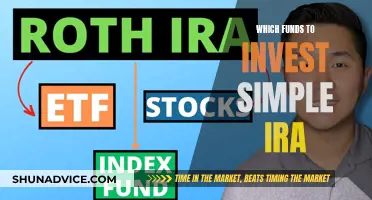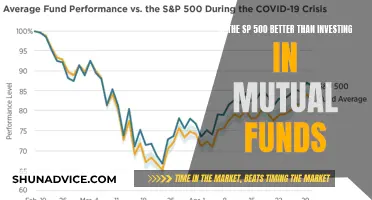
Pooled investment funds are a type of investment vehicle that aggregates small investments from numerous individuals to create a large fund for investment purposes. Each investor is a stakeholder in the fund and benefits from economies of scale, such as lower trading costs per dollar of investment and greater diversification. Pooled funds are often professionally managed and can include mutual funds, hedge funds, exchange-traded funds, pension funds, and unit investment trusts. While pooled funds offer advantages like enhanced buying power and professional management, investors should also consider potential drawbacks, such as fees, tax implications, and reduced control over investment decisions. Understanding the benefits and risks of pooled investment funds is essential before making any investment decisions.
| Characteristics | Values |
|---|---|
| Definition | Pooled funds are funds in a portfolio from many individual investors that are aggregated for the purposes of investment |
| Examples | Mutual funds, hedge funds, exchange-traded funds, pension funds, and unit investment trusts |
| Benefits | Economies of scale, diversification, professional money management, low minimum investments |
| Drawbacks | Commissions and annual fees, tax consequences, lack of individual control over investments, diversification can limit upside |
| Regulation | Investment Company Act of 1940, Securities and Exchange Commission (SEC) |
| Structure | Pooled funds can be standalone companies or entities within a larger business, such as a brokerage house |
| Management | Pooled funds are typically professionally managed, but some are index funds that are not actively managed |
| Trading | Pooled funds aggregate capital to invest as one giant portfolio, allowing access to opportunities available only to large institutional investors |
| Investment Options | Stocks, bonds, mutual funds, and other securities |
| Risk | All pooled investment vehicles carry risk, including the potential loss of principal |
What You'll Learn

Pooled funds: definition and examples
Pooled funds are a collection of funds from multiple individual investors, aggregated for investment purposes. The funds are treated as if they are from a single account holder, allowing investors to benefit from economies of scale, such as lower trading costs per dollar of investment and greater diversification. Pooled funds enable investors to access opportunities typically only available to large institutional investors.
The distinguishing feature of a pooled fund is that it aggregates capital from multiple investors, as opposed to a separate account where only one investor or retirement board contributes funds. Pooled funds are often professionally managed and can include various investment vehicles such as mutual funds, hedge funds, exchange-traded funds (ETFs), pension funds, unit investment trusts, commingled funds, group trusts, real estate funds, limited partnership funds, and alternative investments.
One example of a pooled fund is a mutual fund. Mutual funds are actively managed by professionals, spreading their holdings across various investment vehicles to reduce the impact of any single security on the overall portfolio. This diversification provides a lower-risk investment option, as investors are less affected if one security underperforms. Mutual funds also offer a range of investment options catering to different risk tolerances.
Another example is a unit investment trust, which aggregates funds from smaller investors to invest in stocks, bonds, and other securities. Unlike mutual funds, unit investment trusts do not change their portfolio over the life of the fund and typically invest for a fixed duration.
Pooled funds, such as those offered by The Vanguard Group, Inc., provide investors with the advantage of expanded investment opportunities and reduced costs. However, one limitation of pooled funds is the potential for conflict among investors due to differences in opinions and a lack of control over investment decisions.
Small-Cap Mutual Funds: Strategies for Smart Investing
You may want to see also

Benefits of pooled investment vehicles
Pooled investment vehicles, such as mutual funds, hedge funds, exchange-traded funds, pension funds, and unit investment trusts, offer a range of benefits that make them attractive investment options.
One of the key advantages is the ability to achieve economies of scale. By aggregating capital from multiple individuals, pooled funds allow investors to benefit from lower trading costs per dollar invested. This means that individuals can access opportunities typically available only to large institutional investors, enhancing their buying power.
Pooled funds also offer diversification, which reduces risk. By spreading investments across various vehicles, the impact of any single underperforming security on the overall portfolio is minimised. With hundreds or thousands of securities in a mutual fund, for example, the performance of one security has a lesser effect on the overall portfolio.
Additionally, pooled funds provide access to professional money management. Experienced fund managers ensure that investors receive an optimal risk-return trade-off, aligning investments with the fund's objectives. This is particularly beneficial for investors who lack the time or knowledge to manage their investments independently.
The benefits of pooled funds extend to lower minimum investments and the ability to reinvest dividends and interest to purchase additional fund shares. While there are costs associated with commissions and annual fees, as well as potential tax consequences, the diversification and professional management offered by pooled investment vehicles make them a popular choice for investors seeking to balance risk and return.
TSP L Funds: Choosing the Right Investment for You
You may want to see also

Common types of pooled investment vehicles
Pooled investment vehicles are typically large investment funds built by aggregating small investments from individuals, providing an opportunity for non-wealthy investors or those wanting to invest a small amount of capital to participate in investments that would otherwise be unavailable to them.
Real Estate Investment Trusts (REITs)
REITs are real estate companies that pool money from investors (both individuals and institutions) to purchase real estate, often a large portfolio of properties. They often focus on specific types of property, such as apartment complexes, retail properties, or industrial buildings. While many REITs are traded on public exchanges, certain REITs are closed or private and require a large minimum investment.
Mutual Funds
Mutual funds are another well-known type of pooled investment vehicle. Professional fund managers raise capital from individuals and institutions, aggregate it into a single large fund, and then use it to purchase and manage a diverse portfolio of investments. As a mutual fund investor, you benefit from the expertise of the fund management team and the diversification of owning a wide range of assets. However, it is important to be aware of the risks associated with mutual funds, such as interest rate changes, currency risks, liquidity risk, and the potential for fees to erode returns.
Exchange-Traded Funds (ETFs)
ETFs are investment funds that track a specific index, such as the NASDAQ or S&P 500. Fund managers pool capital from individual investors and institutions and then purchase a basket of equities on a given stock index to replicate the yield and returns of that index. ETFs are known for reducing managerial risk since the fund managers make minimal adjustments to the assets, focusing on replicating the performance of the index. However, investors should be aware of the risks associated with ETFs, such as exotic-exposure risk and certain tax-related risks.
Unit Investment Trusts (UITs)
UITs are pooled investment vehicles that take money from smaller investors to invest in stocks, bonds, and other securities. Unlike mutual funds, UITs do not change their portfolio over the life of the fund and invest for a fixed length of time. UITs provide a fixed portfolio with a specified period of investment, and the investments are sold as redeemable units.
TCI Fund Investment: A Guide to Getting Started
You may want to see also

Risks of pooled investment funds
Pooled investment funds offer several benefits, such as diversification, professional management, and lower entry barriers. However, they also come with certain risks that investors should be aware of:
- Misalignment of interests between investors and asset managers: Management fees are typically charged as a percentage of assets under management, which can create a conflict of interest. Managers may focus more on attracting inflows rather than maximising returns or managing risk. Performance fees can also result in asymmetric pay-offs, where managers earn higher returns even when the fund loses money.
- Valuation errors: Pooled investments are typically valued periodically, and liquidity concerns can lead to valuation errors. These errors can result in real value transfers between selling and buying investors, misstating wealth and collateral values.
- Mismatches between assets and liabilities: Pooled structures that commingle investor funds can expose investors to co-investors who need to redeem their investments. This may force the fund to sell better, more liquid assets, affecting returns and risk.
- Embedded cash or liquidity risk: Many private market funds have cash call structures, requiring investors to contribute when needed. This creates cash flow risks, and fund distributions may be unpredictable, resulting in uncertain flows and tax consequences.
- Higher fees and lower returns: Pooled investment funds often charge higher fees due to their complexity and the number of people involved. These higher fees can lead to lower returns for investors as they eat into profits and make it harder to grow capital.
- Loss of control: When investing in a pooled fund, investors give up control over investment decisions to the fund manager. The manager's decisions may not always align with the individual investor's best interests.
BPI Equity Fund: A Smart Investment Strategy
You may want to see also

How pooled funds are managed
Pooled funds are a generic term for a portfolio of money from many individual investors that is aggregated for investment purposes. Pooled funds are managed by pooling investors' money into a single account, allowing investors to be treated as a single account holder. This enables them to purchase more shares collectively than they could individually, often at discounted prices.
There are various types of pooled funds, including mutual funds, hedge funds, exchange-traded funds, pension funds, and unit investment trusts. Many of these funds are professionally managed, and they offer several benefits to investors. Firstly, pooled funds provide economies of scale, resulting in lower trading costs per dollar invested. Secondly, they enable investors to diversify their portfolios, reducing the impact of any underperforming securities. Additionally, professional management ensures that investors receive the best risk-return trade-off while aligning their investments with the fund's objectives.
The management of pooled funds involves making investment decisions on behalf of the group of investors. In a mutual fund, for example, the fund's holdings are spread across various investment vehicles, such as stocks, bonds, or other securities. This diversification reduces the effect that any single security or class of securities has on the overall portfolio. The fund's investment adviser and portfolio managers determine which securities to buy and sell, while an independent custodian, typically a bank, holds the assets.
To ensure investor protection and compliance, regulatory bodies such as the Securities and Exchange Commission (SEC) enforce rules and conduct inspections. The Investment Company Act of 1940, for instance, provides guidelines for the operation of mutual funds, giving investors peace of mind regarding the security of their investments.
Hedge Funds: Higher Returns, Lower Risk than Mutual Funds
You may want to see also
Frequently asked questions
Pooled investment funds are funds in a portfolio from many individual investors that are aggregated for investment purposes. They allow investors to benefit from economies of scale, resulting in lower trading costs per dollar of investment and greater diversification.
Pooled investment funds offer several advantages, including:
- Economies of scale: By aggregating capital from multiple individuals, pooled funds allow investors to benefit from reduced costs per dollar invested and increased buying power.
- Diversification: Pooled funds invest in a wide range of securities, reducing the impact of any single underperforming security on the overall portfolio.
- Professional management: Pooled funds are typically managed by a team of experts, providing valuable investment expertise and knowledge to individual investors.
- Access to opportunities: Pooled funds enable individual investors to access opportunities typically available only to large institutional investors.
While pooled investment funds offer several benefits, there are also some potential drawbacks to consider:
- Lack of control: Individual investors may have less control over investment decisions made by the group, as consensus is required.
- Additional costs: Pooled funds may incur management fees and other expenses, such as commissions and annual fees, which can reduce the total return.
- Tax implications: The activities of the fund may have tax consequences for investors, such as taxable income from distributed capital gains.
When valuing a pooled investment fund, it is essential to consider the following factors:
- Investment objectives: Understand the fund's investment objectives and strategies to ensure they align with your own goals and risk tolerance.
- Performance and track record: Evaluate the fund's historical performance and the track record of its management team. Consider factors such as returns, volatility, and the types of investments made.
- Fees and expenses: Be aware of the fund's fee structure, including management fees, transaction costs, and any other expenses. Assess whether the fees are reasonable and if they could potentially erode returns.
- Risks: Understand the risks associated with the fund, such as interest rate risk, currency risk, liquidity risk, and other specific risks related to the types of investments made.
- Due diligence: Conduct thorough research and due diligence on the fund, its management team, and the underlying investments. Review offering documents, risk factors, and past performance to make an informed decision.







